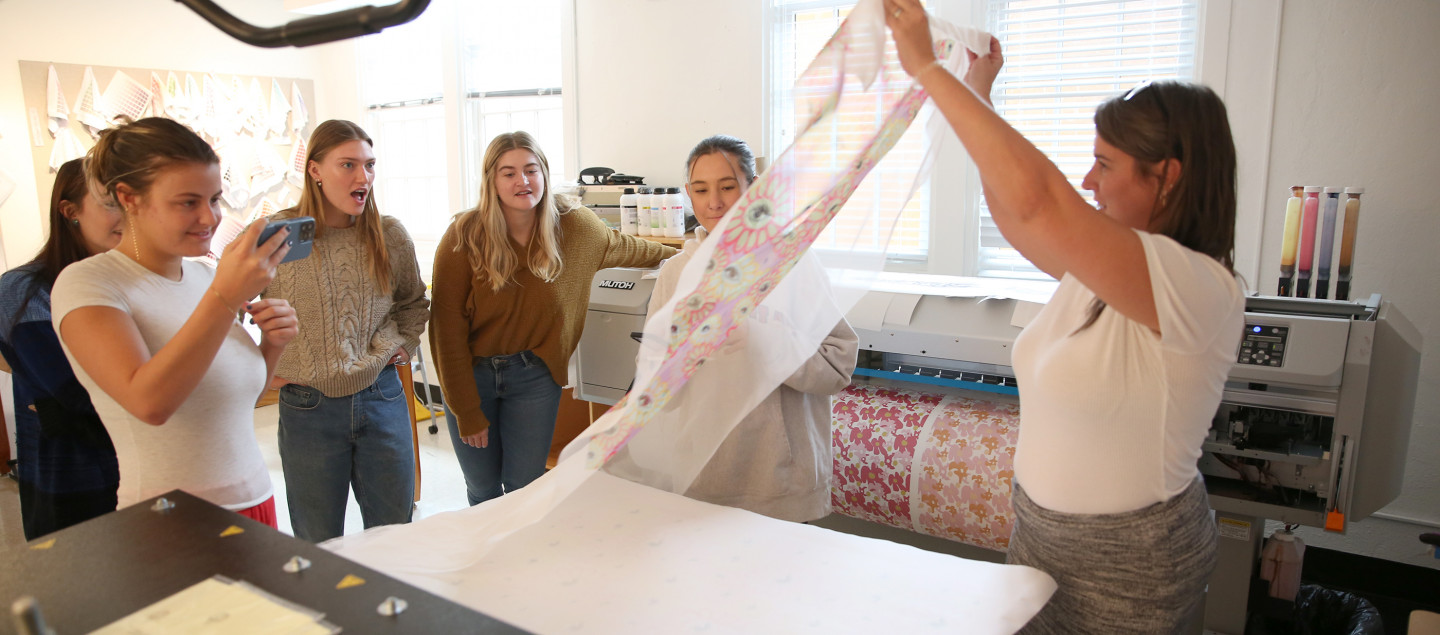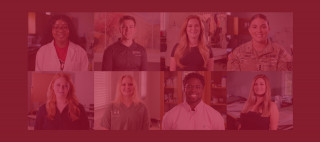ER physician turns to fashion merchandising students for problem-solving

Emergency room physicians have to make quick decisions, few as important as determining appropriate dosages of medication for incoming patients.
Some drugs are dosed using a patient’s height and weight, but for some patients who are unresponsive or too young to know their height or are altered in some way, it’s more challenging.
Local emergency physician Lewis Earnest from St. Mary’s Health Care System turned to an unlikely source to help solve the issue: fashion merchandising students in the College of Family and Consumer Sciences.
The idea was to create bed linens with repeating patterns that a doctor or practitioner can quickly scan to determine a horizontal patient’s height, as opposed to an estimate based on ideal or adjusted body weight.
He reached out to FACS faculty member Laura McAndrews, assistant professor in the department of textiles, merchandising and interiors, and a project was born.
“Speed is one of the keys,” Earnest told students when he visited McAndrews’ class earlier this fall. “These sheets are going to be put on in a hurry, and we have to be able to quickly say ‘This person is 5-8,’ for example. There will be a QR code in the design that will link to a webpage that will automatically calculate the dose of medication they can use.”
The simplest solution would be a bed sheet with a ruler printed along the edges, but Earnest said it isn’t feasible because the product already exists in China.
“We couldn’t do that from an intellectual properties standpoint, and no one really wants that in their hospital because it’s not aesthetically pleasing,” Earnest said.
With the challenge presented, McAndrews’ students got to work designing engineered prints utilizing Lectra’s state-of-the-art Kaledo Style software.
The designs had to be aesthetically pleasing and show measurement throughout the pattern using colors that are branded appropriately for the hospital.
McAndrews said the task perfectly aligned with User-Centered Design Theory, which forces the designer to focus on needs and wants that are outside the traditional design process.
“This design theory aids in creating products for anyone outside the typical target market,” she said. “Students also were able to work on a textile product that was not clothing. This expands their opportunities for working in multiple industries.”
Student Emily Chambers said the project gave her a new appreciation for the design process.
“I learned there are many things to consider when creating designs for other people,” she said, “and many questions need to be asked. In this case, I also had to think about how different colors and patterns would affect a patient’s emotions and anxiety level.”
After the designs were finalized, Earnest selected six student designs as prototypes for fitted bed sheets.
The designs will be reviewed by healthcare professionals at St. Mary’s, and one design will be chosen to make 100 sheets for a trial run at St. Mary’s Good Samaritan Hospital in Greensboro.
Earnest said the designs also are being used to submit the idea for patent protection.
“I was really impressed with how the students approached this design challenge and came up with very creative but functional prints,” McAndrews said. “Even the ones that weren’t chosen were beautiful, just not as functional, and that’s a great lesson for any designer.”
In this category: Innovation
-
Opportunity abounds for FACS design students
Interest in the furnishings and interiors program surges due partly to diverse career options it offers students.

-
Innovative lab leading research into next generation fabrics
UGA, industry partners team up in search of a more sustainable filter

-
We Are FACS campaign showcases college’s diverse career paths
Launched in June, the campaign raises awareness about the college's offerings

-
Dominating over junk food on social media
Study finds healthier foods can be made more appealing through a few simple steps

-
FACS grad takes home $25,000 prize in UGA Collegiate Great Brands Competition
UGA Entrepreneurship pitch contest draws 52 student startups for their chance at $25,000 prize
